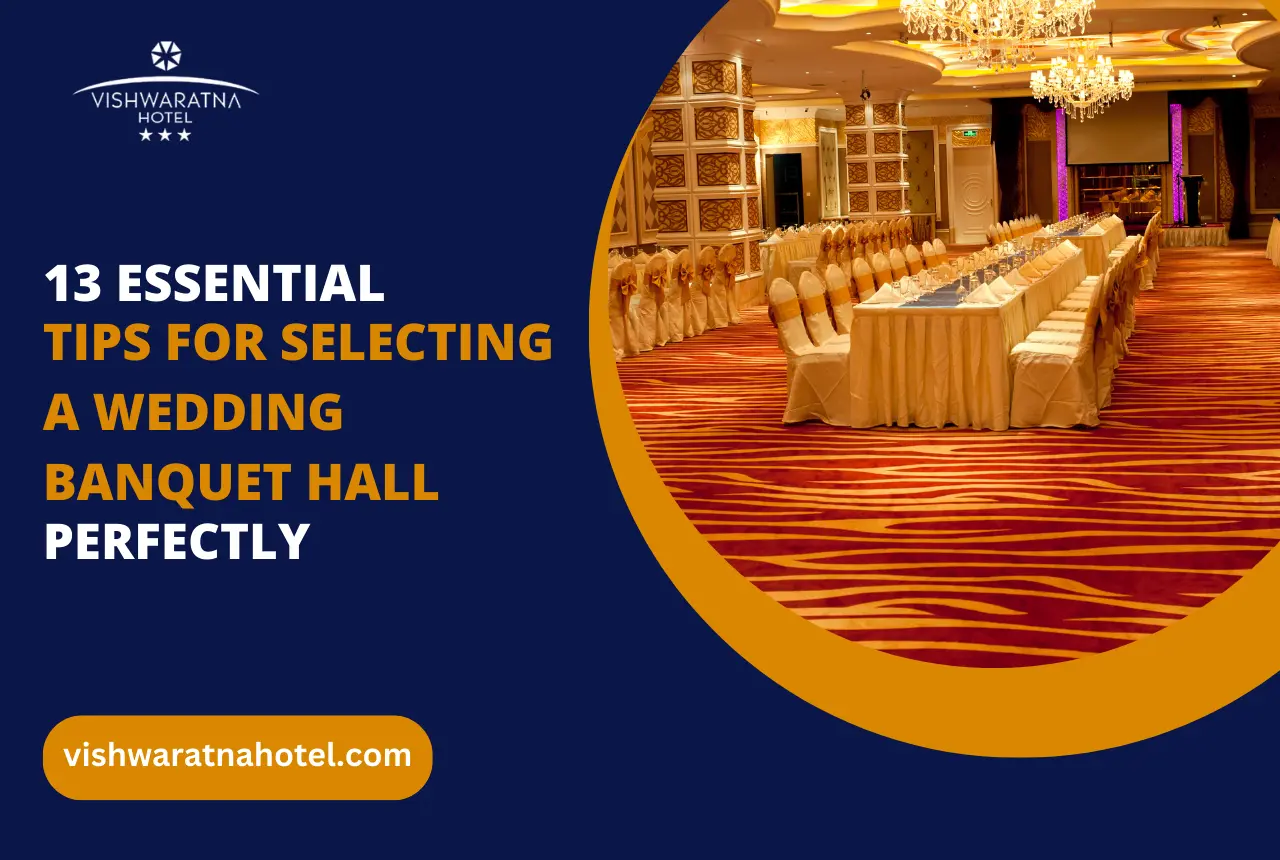Choosing the perfect wedding banquet hall is one of the most important decisions you’ll make while planning your big day. Read this blog till the end to get the essential tips for selecting a wedding banquet hall.
The banquet hall is a popular choice for weddings, offering a blank canvas for your vision and ample space for celebration. But with so many options, choosing the right one can feel overwhelming. Fear not, lovebirds! This guide equips you with 10 essential tips to navigate the banquet hall selection process with ease and confidence.
Essential Tips for Selecting a Wedding Banquet Hall Perfectly
1. Create a Wedding Reception Venue Checklist

Before you start visiting potential venues, make a wedding reception venue checklist. This list should include must-have features like the type of ambiance, location, capacity, and available amenities. This way, you can quickly narrow down your options and stay organized.
2. Determine the Wedding Banquet Hall Capacity
Understanding the wedding banquet hall’s capacity is essential. You want a space that comfortably accommodates all your guests. Too small, and your guests will feel cramped. Too large, and the venue may feel empty. Confirm the capacity with the venue manager and ensure it aligns with your guest list.
3. Evaluate the Cost of Rent a Wedding Venue

Budget is a significant factor when selecting a venue. The cost to rent a wedding venue can vary widely based on location, size, and services provided. Compare different venues to find one that fits your budget without compromising on your must-haves. Don’t forget to ask about any additional fees that may not be included in the initial quote.
4. Explore Unique Wedding Reception Venues
If you’re looking for something different, consider unique wedding reception venues. From historic mansions to art galleries, many non-traditional locations can add a special touch to your wedding day. These venues often provide a distinct charm and memorable backdrop for your celebrations.
5. Look for Affordable Wedding Reception Halls
Affordability is key, but you don’t want to sacrifice quality. Seek out affordable wedding reception halls that offer excellent services without breaking the bank. Sometimes, lesser-known venues can provide great value with a personal touch.
6. Ask the Right Questions

When visiting potential venues, come prepared with a list of questions to ask the wedding venue. Inquire about availability, what’s included in the rental fee, their policy on external vendors, and any restrictions they might have. Clear communication ensures there are no surprises later on.
7. Consider Wedding Ceremony and Reception Locations
Having your wedding ceremony and reception at the same location can simplify logistics and save money. Look for venues that offer beautiful spaces for both parts of your celebration. This convenience can also enhance your guests’ experience.
8. Check Out All-Inclusive Wedding Banquet Halls

All-inclusive wedding banquet halls can make planning much easier by bundling services like catering, decorations, and entertainment into one package. These venues often provide a stress-free planning process, allowing you to focus on enjoying your special day.
9. Choose the Best Location for Your Wedding Reception
The best location for your wedding reception is one that is easily accessible for most of your guests. Consider the distance, parking facilities, and nearby accommodations. A convenient location ensures everyone arrives on time and in good spirits.
10. Start Booking a Wedding Venue Early
Popular venues get booked quickly, sometimes a year or more in advance. Start booking a wedding venue as soon as you have a date in mind. This early planning increases your chances of securing your dream location.
11. Consider Your Wedding Vision and Theme

Your wedding venue should be an extension of your love story! Does your dream wedding evoke elegance, rustic charm, or a modern vibe? Choose a banquet hall whose aesthetics complement your theme. The venue’s layout and ambiance significantly impact the overall experience. Imagine your ceremony bathed in soft lighting and the dance floor buzzing with energy!
12. Review Contracts Thoroughly
Before signing on the dotted line, take time to meticulously review the venue contract. Understand all terms and conditions, including cancellation policies, payment schedules, and security deposits. Don’t hesitate to ask questions if anything seems unclear.
13. Trust Your Gut Feeling
Beyond logistics, choose a venue that feels right. Pay attention to the venue staff’s professionalism and responsiveness during the selection process. Their positive attitude and willingness to accommodate your needs can significantly impact your wedding experience.
Conclusion
Selecting the perfect wedding banquet hall requires careful planning and consideration. By using a detailed checklist, understanding venue capacity and costs, and asking the right questions, you can find a venue that fits your vision and budget. Don’t forget to explore unique and affordable options, and consider all-inclusive packages for a seamless experience.
FAQs
1. What should I include in my wedding reception venue checklist?
- Your checklist should include location, capacity, availability, cost, services provided, parking, and any restrictions or policies.
2. How far in advance should I book my wedding venue?
- It’s advisable to book your wedding venue at least a year in advance to ensure availability.
3. What are some unique wedding reception venues?
- Consider historic buildings, art galleries, botanical gardens, and rooftop venues for a unique setting.
4. How can I find affordable wedding reception halls?
- Look for lesser-known venues, community centers, or off-peak season dates to find more affordable options.
5. What questions should I ask a potential wedding venue?
- Ask about their availability, included services, external vendor policies, capacity, and any additional fees.


